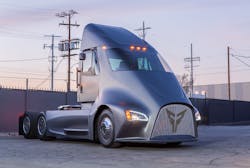What truckers should watch out for in 2018
By Gary Brooks, Syncron
As the chief marketing officer for Syncron – a cloud-based aftermarket “service optimization” firm – Gary Brooks tries to stay close to changes that will affect global supply chains. And right now he sees several trends gaining steam that will impact trucking. “Today’s supply chain has become more complicated than ever,” he said. “The supply chain is in one of the most disruptive periods ever and trucking is one industry that is feeling these changes in a big way.” In this guest column, Brooks highlight four of what he thinks will be the biggest disruptors of trucking in the years ahead.
Well, 2018 is finally upon us, and if 2017 was any sort of indication, the new year is going to be another hectic one for the trucking industry
It will be rife with new technology and business strategies that will shake-up the industry – especially when it comes to coping with after-sales and manufacturing needs.
With that in mind, here are four topics the trucking industry needs to keep in mind moving forward.
- Driverless Trucks and the Trucking Workforce
- Electric Vehicles Will Change After-Sales Service Needs
With big names like Tesla – as well as other players – planning to roll out electric “big rigs” that can run for more than 500 miles on a single charge as early as 2019, electric vehicles are poised to shake up trucking in the more immediate term. Truckers must prepare to shift their after-sales service strategies to reflect this change, ensuring service part inventories are updated appropriately to repair and maintain these new vehicles.
- More Groundwork will be Laid for Platooning
As self-driving trucking continues to evolve, platooning will become an industry-wide fixture moving forward. Platooning shrinks the proximity between trucks and therefore increases road capacity. This improves safety for drivers – who would can rest during platoons – and sets a fixed speed for the platoon, ultimately decreasing emissions. While platooning may be in the more distant future, as agreements will have to be reached between competing fleets about platooning with one another, it represents a unique idea that could change the industry. By the by, it’s already seeing some large interest in Europe.
- IoT Allows for Better Performance and Maximum Product Uptime
With features ranging from in-cabin WiFi to “smart engines” that provide ongoing updates about vehicle performance, today’s trucks are more connected than ever before. By 2020, the Internet of Things [IoT] industry will be worth a whopping $267 billion. And as IoT expands, truckers will gain better insight into vehicle performance. This will enable preemptive maintenance and better access to parts that will optimize vehicle uptime and eliminate costly breakdowns – ultimately delivering more uptime and superior operating results.

